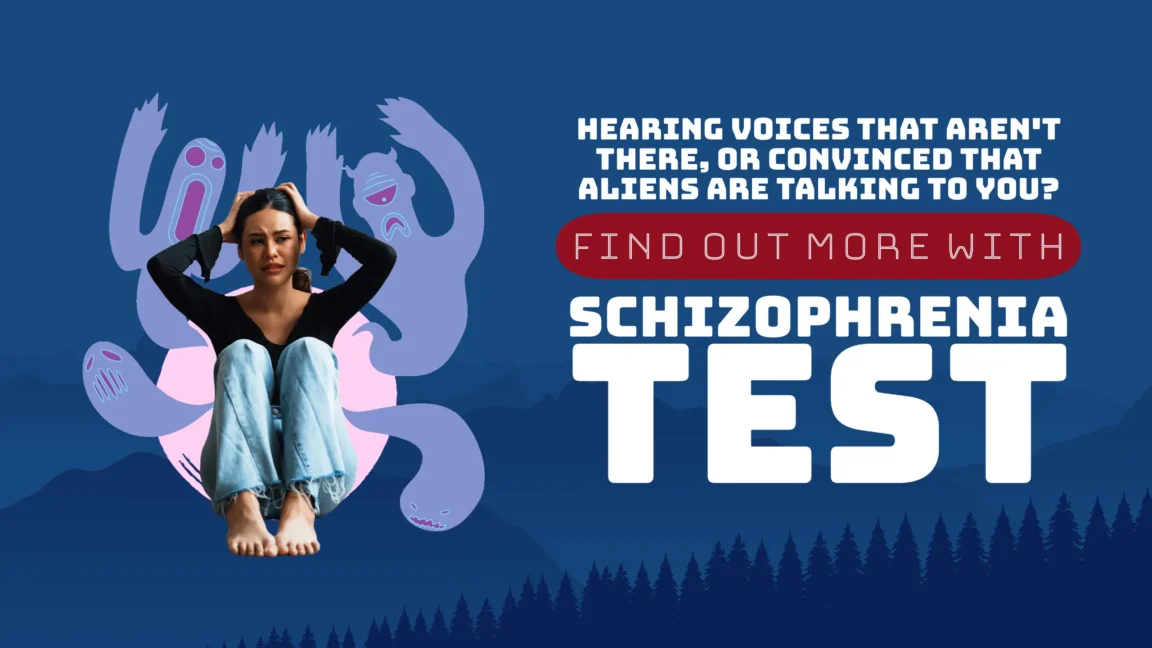Schizophrenia Test: A Step Towards Mental Clarity
While symptoms of schizophrenia are not common, when they occur, they can significantly disrupt an individual’s personal, social, and professional life. Recognizing these symptoms early is key to managing their impact effectively. The Schizophrenia Test is designed to help individuals identify potential symptoms of schizophrenia, guiding them toward understanding their mental health better and seeking timely professional support if needed.
What Is Schizophrenia?
Schizophrenia is a complex mental health condition marked by varied positive symptoms, such as distorted thinking, hallucinations, such as hearing voices, and emotional withdrawal. This is a journey through a world that differs significantly from the typical reality experienced by most. In some cases, medical professionals might use tools like a CT scan to rule out other conditions in people with schizophrenia.
Schizophrenia and Bipolar Disorder, though distinct, share symptom overlap, genetic links, and diagnostic challenges. Both can exhibit mood disturbances and psychotic symptoms, complicating accurate diagnosis. They often require similar treatment strategies involving medication and psychotherapy, and both significantly impact daily functioning and quality of life.
Understanding these connections is crucial for effective treatment and management.
Why Take The Schizophrenia Test?
Taking this Schizophrenia Test can be a significant first step in understanding your mental health, especially if you’re concerned about symptoms common in mental illnesses like schizophrenia. It’s designed to highlight symptoms of schizophrenia, offering clarity and direction for those feeling lost in their thoughts and experiences.
Expert Insight
The National Institute for Health and Care Excellence (NICE) focuses on recognizing and managing psychosis and schizophrenia in adults. Their guidelines emphasize early recognition and treatment to improve care and focus on long-term recovery. They also highlight the importance of checking for coexisting health problems and supporting family members and carers of those with schizophrenia.
NICE continually updates its recommendations to include current research and treatment strategies, such as potential updates regarding antipsychotic medication and managing antipsychotic-induced weight gain.
How the Test Works
This Schizophrenia Test comprises 15 questions, each reflecting common schizophrenia symptoms. Your answers will be scored, providing insight into your mental health state.
Scoring is assigned as follows:
- Each question has multiple-choice answers, with scores ranging from 0 to 45.
- The total score will place you in one of five categories, each indicating a different level of symptom severity.
Interpreting Your Test Results
Your score will fall into one of five categories, each with tailored advice:
- 0-10: Low Likelihood
- 11-20: Mild Indicators
- 21-30: Moderate Concern
- 31-40: High Concern
- 41-45: Very High Concern
Recommendations to Prevent it:
While schizophrenia, a serious mental illness, cannot be ‘prevented,’ certain strategies can help manage symptoms and reduce their impact. These include stress management, avoiding psychoactive substances, maintaining social connections, and regular mental health check-ups, which are particularly important for people with schizophrenia.
Important Note
This Schizophrenia Test is not a substitute for a professional diagnosis. It’s a tool to help guide you and should be followed up with professional consultation.
Instructions
Answer each question honestly based on your experiences. There are no right or wrong answers, only what feels true to your experiences.
Disclaimer
This test is for informational purposes only and should not be considered a diagnosis of schizophrenia. Only a qualified healthcare provider can diagnose schizophrenia, often after a comprehensive assessment that may include a CT scan to exclude other causes.
Try Other Test
- Question of
Do you often hear voices that others don’t?
- Never
- Rarely
- Occasionally
- Frequently
- All the time
Correct Wrong
- Question of
Do you believe others are plotting against you?
- Never
- Rarely
- Occasionally
- Frequently
- All the time
Correct Wrong
- Question of
Do you find yourself speaking less than usual, even in social situations?
- Never
- Rarely
- Occasionally
- Frequently
- All the time
Correct Wrong
- Question of
Do you often feel confused about what is real and what is not?
- Never
- Rarely
- Occasionally
- Frequently
- All the time
Correct Wrong
- Question of
Do you find it hard to express emotions or feel inappropriate emotions?
- Never
- Rarely
- Occasionally
- Frequently
- All the time
Correct Wrong
- Question of
Do you often feel disconnected from your own thoughts or body?
- Never
- Rarely
- Occasionally
- Frequently
- All the time
Correct Wrong
- Question of
Do you have difficulty organizing your thoughts or speaking coherently?
- Never
- Rarely
- Occasionally
- Frequently
- All the time
Correct Wrong
- Question of
Are you experiencing significant changes in your daily behavior or habits?
- Never
- Rarely
- Occasionally
- Frequently
- All the time
Correct Wrong
- Question of
Do you feel intense and inappropriate suspicion or paranoia?
- Never
- Rarely
- Occasionally
- Frequently
- All the time
Correct Wrong
- Question of
Do you have trouble distinguishing between reality and your imagination?
- Never
- Rarely
- Occasionally
- Frequently
- All the time
Correct Wrong
- Question of
Are your thoughts often dominated by unusual or disturbing content?
- Never
- Rarely
- Occasionally
- Frequently
- All the time
Correct Wrong
- Question of
Do you find social interactions increasingly difficult or stressful?
- Never
- Rarely
- Occasionally
- Frequently
- All the time
Correct Wrong
- Question of
Have you noticed a decrease in your ability to feel pleasure?
- Never
- Rarely
- Occasionally
- Frequently
- All the time
Correct Wrong
- Question of
Are you experiencing severe mood swings or emotional outbursts?
- Never
- Rarely
- Occasionally
- Frequently
- All the time
Correct Wrong
- Question of
Do you find yourself neglecting personal hygiene or daily responsibilities?
- Never
- Rarely
- Occasionally
- Frequently
- All the time
Correct Wrong


